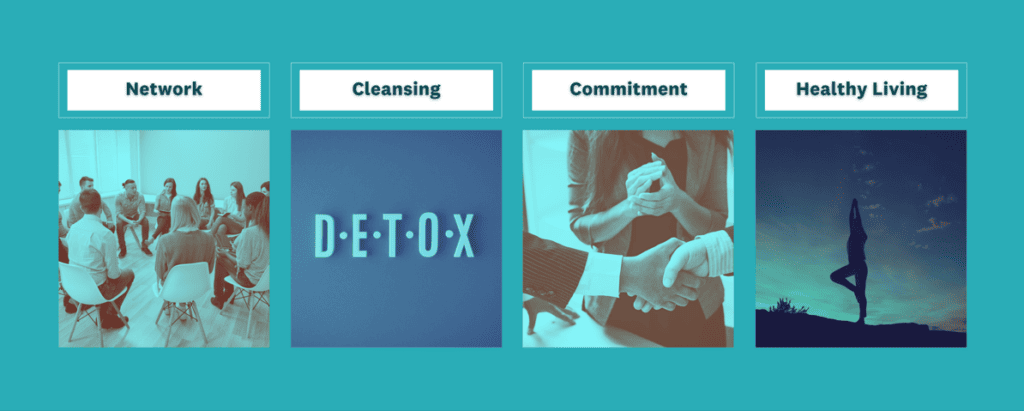Substance use disorder (SUD) is a complex and challenging condition that affects millions of individuals worldwide.
Recovery from substance use disorder is a lifelong process of change, healing, and personal growth. SAMHSA provides the following working definition of recovery: “A process of change through which individuals improve their health and wellness, live a self-directed life, and strive to reach their full potential.”
Key Elements of Recovery:
- Acknowledgment and Commitment:Embarking on the journey to recovery begins with recognizing the existence of a substance use disorder and embracing a commitment to change. This entails acknowledging personal responsibility, understanding the necessity for assistance, and demonstrating readiness for change by seeking help and support.
- Detoxification and Physical Healing: Detoxification, even if it’s just a break, is often the initial stage of recovery, aimed at managing symptoms of craving and withdrawal as the body and brain recalibrate. This may involve medical supervision to manage withdrawal symptoms and ensure the individual’s safety. Physical healing includes addressing any health issues that may have resulted from chronic substance use and adopting additional habits that support a healthy lifestyle.
- Therapy and Counseling: Therapy and counseling play a crucial role in recovery. Individual and group therapy sessions provide a supportive environment to explore the underlying causes of substance use disorder, develop coping skills, and address any co-occurring mental health conditions. Cognitive-behavioral therapy (CBT), motivational interviewing, and other evidence-based approaches are commonly used.
- Building a Supportive Network: Recovery often thrives in the context of a supportive network. This may include attending support groups like Alcoholics Anonymous (AA) or Narcotics Anonymous (NA), where individuals can connect with others who have faced similar challenges. You may also find success in SMART Recovery and Moderation Management. Building healthy relationships with family, friends, and mentors also provides a strong support system. You can find more resources here.
- Lifestyle Changes and Relapse Prevention: Recovery involves making significant lifestyle changes to support sustained change. This may include adopting healthier habits, finding new hobbies and interests, and creating a structured routine. Learning effective mindfulness strategies and developing coping mechanisms to manage triggers and cravings are essential for maintaining long-term recovery.

The Significance of Recovery from Substance Use Disorder:
- Improved Physical and Mental Health: Recovery allows individuals to heal physically and mentally, reducing the detrimental effects of substance use on the body and mind. It provides an opportunity to restore vitality, clarity, and emotional well-being.
- Rebuilding Relationships: Substance use disorder often strains relationships with loved ones. Recovery offers a chance to mend broken bonds, rebuild trust, and foster healthier connections. It allows individuals to show their commitment to change and create a supportive environment for both themselves and their loved ones.
- Personal Growth and Empowerment: Recovery is a transformative process that promotes personal growth and empowerment. Through self-reflection, therapy, and embracing healthier choices, individuals discover their strengths, develop resilience, and gain a renewed sense of self-worth.
- Rediscovering Purpose and Fulfillment: Substance use disorder can erode one’s sense of purpose and fulfillment. Recovery opens the door to rediscovering passions, setting and achieving goals, and finding new meaning in life. It provides the opportunity for individuals to live a purposeful and fulfilling existence.
Recovery from substance use disorder is a courageous and transformative journey towards a brighter and healthier future. It involves acknowledging the problem, seeking help, and engaging in a comprehensive process of healing and growth. Through therapy, support networks, lifestyle changes, and self-discovery, individuals can break free from the chains of addiction, rebuild their lives, and find joy, purpose, and fulfillment.
Other Resources
The Power of Allyship: Supporting Individuals in Recovery from Substance Use Disorder

The journey towards recovery from substance use disorder is a complex and challenging process that requires immense strength, support, and understanding.
Early Recovery: What to Do When You Transition Out of Treatment

The early days of recovery are crucial.
It’s a great time to prioritize, reflect, and learn to be kind to yourself.
